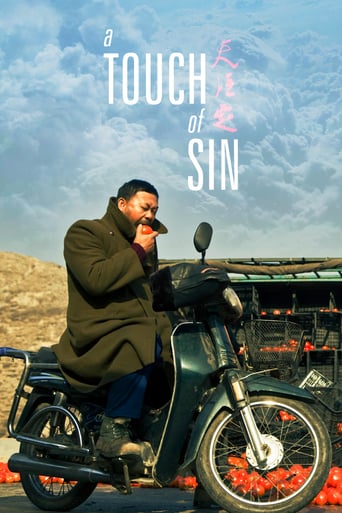

Sorry, this movie sucks
... View MoreAn absolute waste of money
... View MoreA bit overrated, but still an amazing film
... View MoreWhile it doesn't offer any answers, it both thrills and makes you think.
... View MoreThe IMDb description irritates me immensely. This is not about random acts of violence, though perhaps they might be the sort of acts characterised as such by any deliberately superficial media outlet. Each of four acts of violence demonstrates one character's breaking point. One shows a personal response to social injustice and corruption; another, a reaction to the stultifying culture and impossibility of a socially acceptable alternative; the third, an outburst against gender hierarchy, oppression and humiliation; finally, an escape from the intransigent work culture. This paints quite a well-rounded picture of much of what appears to be broken in China. It is shot with elegance and edited gracefully. The dialogue rings true and the mis-en- scene is extremely evocative. My only qualm is that the violence presents itself as realistic but in fact is not. When someone is cut deeply or shot in the belly, they scream; they do not fall silently and become inanimate. That's probably a concession to censors but, I feel, is a cop-out.
... View MoreWhile cinema should have elements of universal appeal, to appreciate "A Touch of Sin" it's useful to have some sense of Chinese society and history. Many of the elements in A Touch of Sin would resonate well with a Chinese audience, but I'm afraid most Westerners wouldn't catch them. The very fact that dialogue in each scenario is conducted in a very distinctive (mutually unintelligible) local dialect is totally missed by the English subtitles (indeed, in China, the film would need standard Mandarin subtitles!)-- but the issue of dialect and local origins in a 'wanderer's society" like China would have a huge impact on the Chinese viewing audience.Other reviewers mention that when violence occurs, bystanders don't seem to have any reaction -- this can be seen as a direct homage to the great Lu Xun (China's foremost modernist writer of the 1920s) who claimed that his very entry into the world of literature was inspired by a photograph of a public execution in China --where gawking bystanders in the background of the photo had no reaction to the violence happening before them. Similarly, the "assassination at the temple" (first story) can be seen as a direct reference to the famous 1935 assassination of the notorious Shanghai warlord Sun Chuanfang as he was praying in a Buddhist temple (an assassination that was seen as totally righteous and virtuous by the Chinese public at the time). And finally -- the very existence of the Chinese Communist Party, and the entire People's Republic of China -- is due to an ideology that the social injustices caused by capitalism must be solved by violence. (Think Dahai's killing spree, but on a mass scale). If you want to know why the film is not shown in China, think no further than this!!We always analyze Western films within their cultural and historical contexts....to not do so with non-Western films does an injustice to the film and the film-maker.
... View MoreA lone gunman, fighting for justice in a world full of corruption, intent upon killing the main culprit and not backing down until he has done so. It sounds like something out of a John Ford western, but in fact it's the first of four stories in 'A Touch Of Sin'. This Chinese movie borrows quite a few themes from the classic westerns. Male dominance, for example, and a society lacking morality, but above all: violence as the ultimate solution. For a Chinese film maker, this is a brave movie. It paints a very bleak picture of Chinese society, by tackling issues like corruption, crime, prostitution and the exploitation of workers in enormous factories. These are very sensitive issues in modern day China, but still this movie got the green light from the authorities and wasn't banned from Chinese cinemas. But not every brave movie is a good one. The problem with 'A Touch Of Sin' is that it consists of four independent stories which differ a good deal in quality. The first one, with the lone gunman, is the best because it is a clear, focused story. Others are sometimes difficult to understand because they are too expansive and too long. The common feature in each of the four stories is the violence. Director Zhangke Jia shows it in a very graphic way, reminiscent of crime movies from Hong Kong or Japan. The bullet holes and blood splattering seem a bit out of place in a film appealing to an art-house audience, but at the same time it gives this movie a nice nihilistic touch.
... View MoreChinese film-maker Jia Zhang-ke's new film 'A Touch of Sin' is made up of four stories loosely connected to each other. <!--more-->Zhou San (Wang Baoqiang) introduces us to the first of the four characters, a quiet man who seems to have a lot to hide. As with the other characters, Zhou San works away from home and thus separated from his family and home. Dahai (Jiang Wu) tells another story, a coal miner who won't stop pestering everyone about how his boss sold off the mine and got rich while never distributing the wealth to the village. One too many outbursts leads to a chain of events which ends badly.The third story sees Hubei (Zhao Tao) working in a massage parlour as a receptionist, who is having an affair with a married man. Having waited so long for him to make up his mind, Hubei gives him 6 months to leave his wife. Troubles with work and her private life soon catch up with Hubei, as it does with the final character Xiao Hui (Luo Lanshan). The youngest of the four characters, Xiao Hui drifts from job to job, seemingly in a permanent state of flux. He left his last job through an act of cowardice, involving a work-related accident with a colleague. Permanently broke and unable to find his feet anywhere, Hubei finds the struggle of keeping a job and sending money to his mother difficult to fathom.'A Touch of Sin' exposes the four individuals struggles in modern China, revealing a growing discontent between the exploited working classes and the ruling elite which forces them to take measures into their own hands. Animals are metaphors for these people who are transported from place to place, who have no apparent control over their location or destiny. These lost souls are defined by a stark landscape of degradation, greed and corruption. There's nowhere to hide, each cannot continue with the life they've led, being controlled by others who gain everything and return very little. Each has to make a decision whether to become part of the system which will benefit themselves but lose all sense of morality and ethics, to avenge their ills, or to curl up and die.'A Touch of Sin' starts off well, Dahai's story is one which will probably interest you the most. But the film is too long, and suffers from a second half which doesn't quite match the tension and drama of the first half. Its a bleak and unforgiving film, such is the pessimism in Zhang- Ke's dehumanised China that there is simply nowhere to run. In one scene, one characters asks another if he ever feels like travelling abroad. "Why would I?" he replies. "Everywhere is broke. Foreigners come here now." Welcome to the new China.
... View More